13 Volunteer Nursing Students Serve on 1st RCP Program in Peru
Nursing students from the College of Saint Benedict and Saint John’s University in Minnesota contributed immensely to Global Volunteers’ First Reaching Children’s Potential (RCP) Program in Peru. The Peru RCP Program, a replica of Global Volunteers’ Tanzania RCP Program, officially launched in the summer of 2022. Global Volunteers’ staff and community leaders laid the groundwork for volunteers to be engaged in the program beginning that fall. In November 2022, thirteen nursing students eagerly and effectively put their skills and knowledge to use, alongside their professor, in Ventanilla, north of Lima. During their two-week service-learning program, the student volunteers worked with and learned from and about the local people, and absorbed the public health reality of Ventanilla. Read on for details about this student group’s remarkable experience and the first RCP team to serve in South America.
Inspiring Students to Provide Culturally-Competent Care
As a researcher in public health nursing, cultural competence in the healthcare workforce, and enhancing students’ cultural competence, Professor Rachelle Larsen’s reasons for participating in a long-term community development project with nursing students run deep. “I understand the importance of global citizenship and inclusion. These two concepts are particularly important for nurses,” Larsen said. “I hope to help students become more self-aware and inspire them to continue to strive to provide culturally competent care.” Professor Larsen chose Global Volunteers’ RCP Program in Peru to offer students the opportunity to learn about the public health reality of a Latin American country and gain skills working with diverse populations, all while providing their nursing skills to the local community.
This service program was an exceptional opportunity for students to learn about healthcare realities in another part of the world and provide care. Nursing student Jenna Bukowski described her motivation for serving as follows; “I would like a unique experience seeing health care in a different part of the world.” Her classmate, Caitlin Salfer, echoed this sentiment. “I want to learn about the people and culture of Peru more and be able to offer myself as a resource for those who need an extra set of hands.” Makayla Miller highlighted the importance of such an experience in her nursing career, “I’d love to experience a different culture and serve people right where they’re at. I believe it will go on to impact my nursing career in many great ways.”
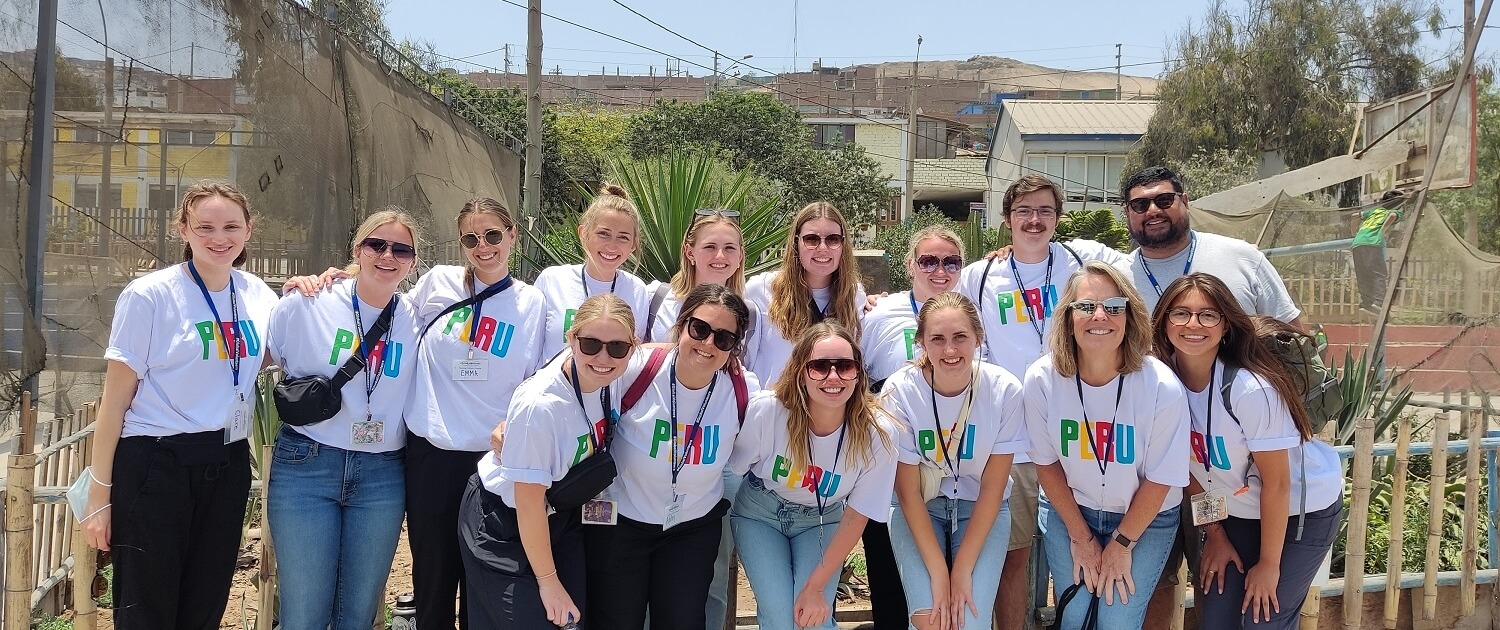
“I understand the importance of global citizenship and inclusion. These two concepts are particularly important for nurses. I hope to help students become more self-aware and inspire them to continue to strive to provide culturally competent care.”
– DR. RACHELLE LARSEN, COLLEGE OF SAINT BENEDICT AND SAINT JOHN’S UNIVERSITY
During their two weeks of service in Peru, the 13 nursing students and Dr. Larsen learned about the realities of public health in Ventanilla, a district north of Lima with nearly 300,000 mostly impoverished people living in 680 barrios. Before traveling to Lima, the students participated in an on-campus introductory session conducted by Co-founder and CEO, Bud Philbrook, who described Global Volunteers’ Peru program. The students also read materials about Peru, its health care system, and the RCP Program; studied Global Volunteers’ Philosophy of Service; and learned about their volunteer assignments.
On their first full day in the country, Global Volunteers’ Peru Team Leader, Diego Acosta, led an orientation meeting. Diego offered fundamental information about Peru, the RCP Program framework, the community’s multiple needs, the insufficient healthcare in the area, and how the volunteers could best be engaged and helpful. He also offered an introductory Spanish language lesson and a team goal-setting session to help focus the volunteers’ work. With this information and background, the nursing students were ready to begin their volunteer work in Ventanilla.
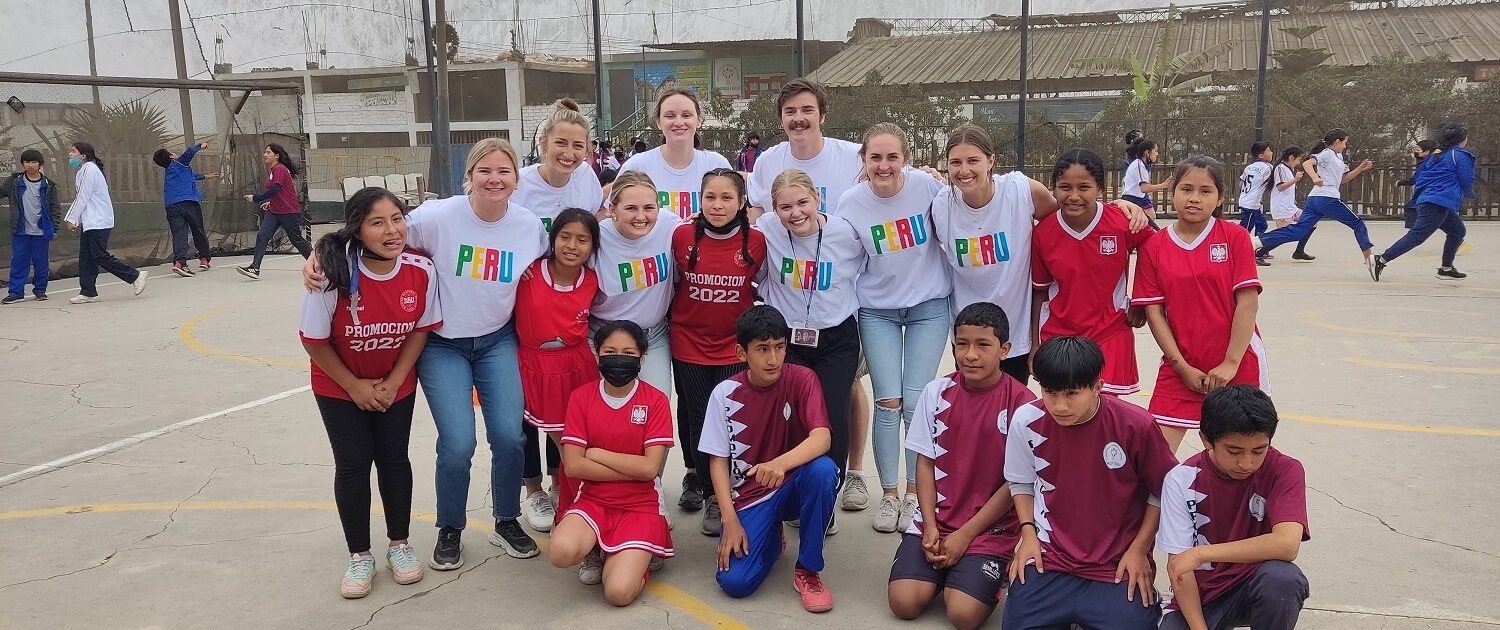
“I’d love to experience a different culture and serve people right where they’re at. I believe it will go on to impact my nursing career in many great ways.”
– Makayla Miller, College of Saint Benedict nursing student and volunteer in Peru
Health Assessments and Hands-on Experience
Working in the clinic at Sagrada Familia Children’s Home, Global Volunteers’ community partner and the center of the RCP Program in Peru, the volunteer students conducted health assessments focusing on anemia screening. Of particular importance, nursing student Makayla Miller detected a heart murmur in a child during an examination, and because of that, the child received appropriate follow-up healthcare. The students also measured and recorded data on children’s height and weight, performed vision checks, and prepared antibiotics. The vision checks were beneficial because the students, unfortunately, found many children at Sagrada Familia could not see clearly. Now that Sagrada Familia staff are aware of the problem identified by the nursing students, they can help the children obtain eyeglasses.
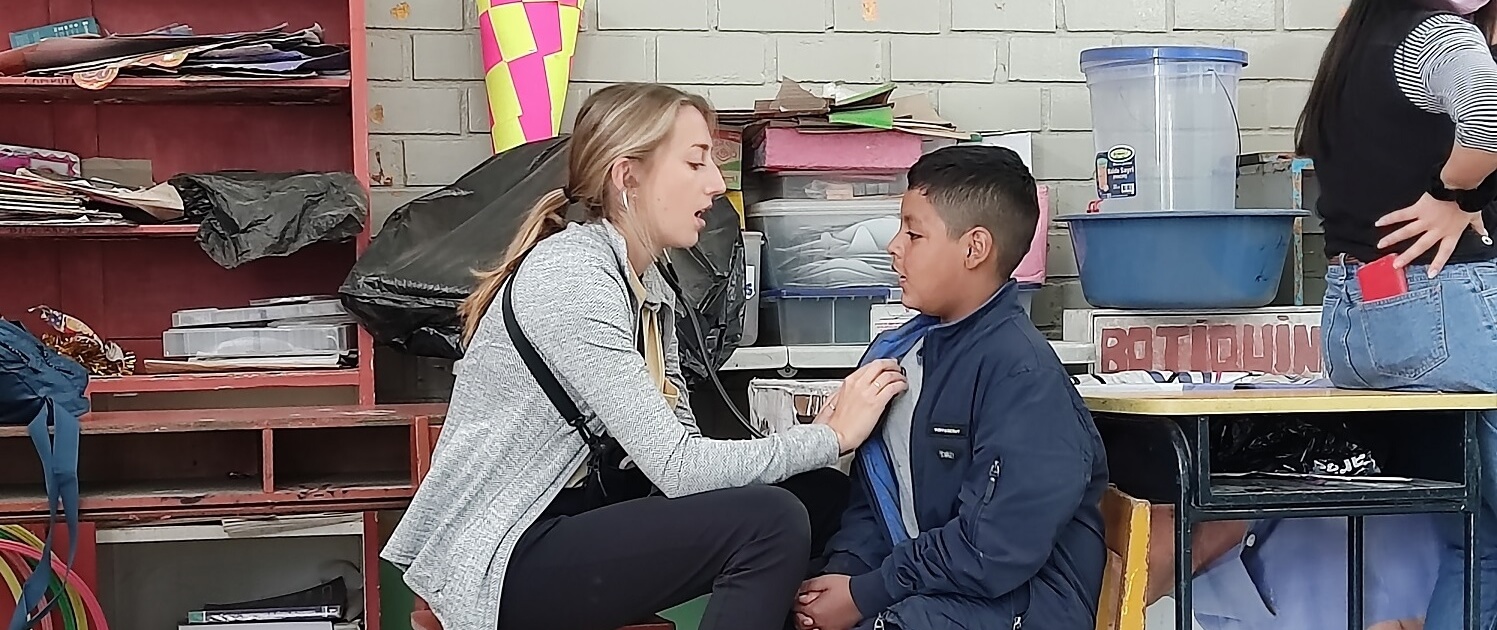
This service program proved valuable for the nursing students and the children they served. Emma Anderson reported on her experience and what she learned. “Because the group of us are nursing majors, our role was health assessments and workshops about First Aid and handwashing. We were also lucky to be the first group to participate in the RCP Program. I learned how to be more resourceful and have better communication and learned my limits. I also stepped outside my comfort zone a lot.” Clare Michalowicz emphasized, “Early intervention is the best way to ensure a good future for a child. Service does not mean imposing your worldview on others. To make meaningful change, one must have an open mind and heart.” Lexi Hanson reported, “I am definitely going to learn more from these kids than they will from me. There was a boy today when leaving daycare that started to cry when we were leaving. It made me stop and think how I could have made such an impact in this boy’s life where our communication was limited between us. Another moment that took me aback was when the boy came around handing out Pokémon cards to us. I thought to myself, this boy has way less than I do and he’s giving me a gift. It made me feel extremely honored. These people welcoming us into their lives and world is a blessing I will forever be grateful for.”
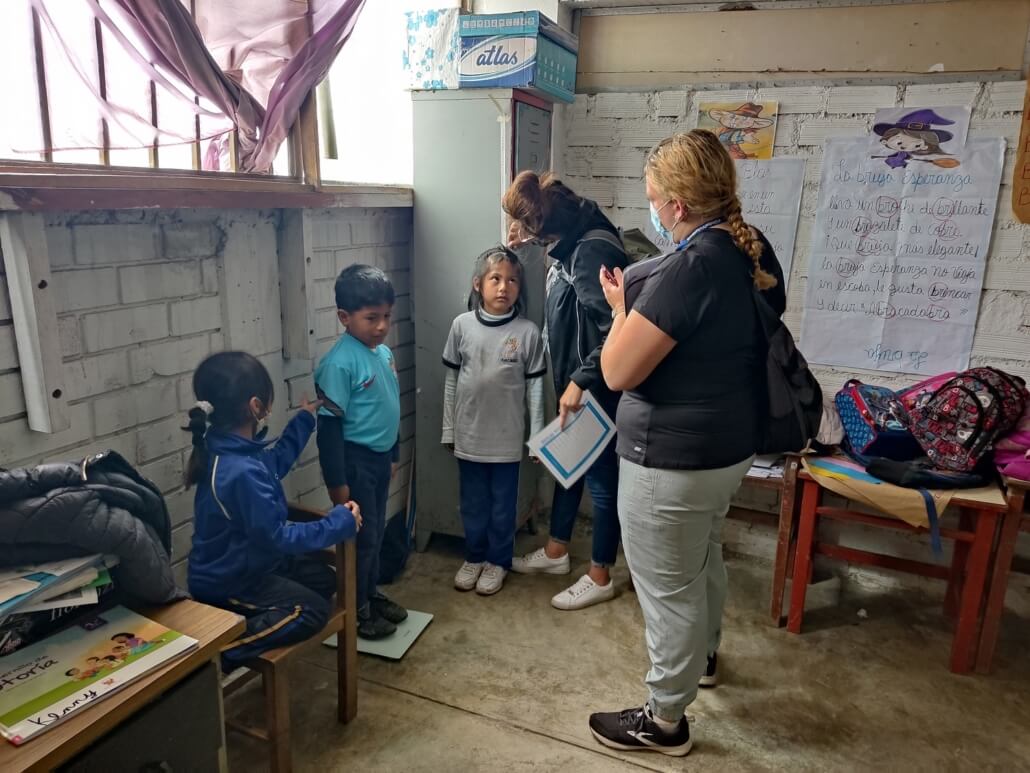
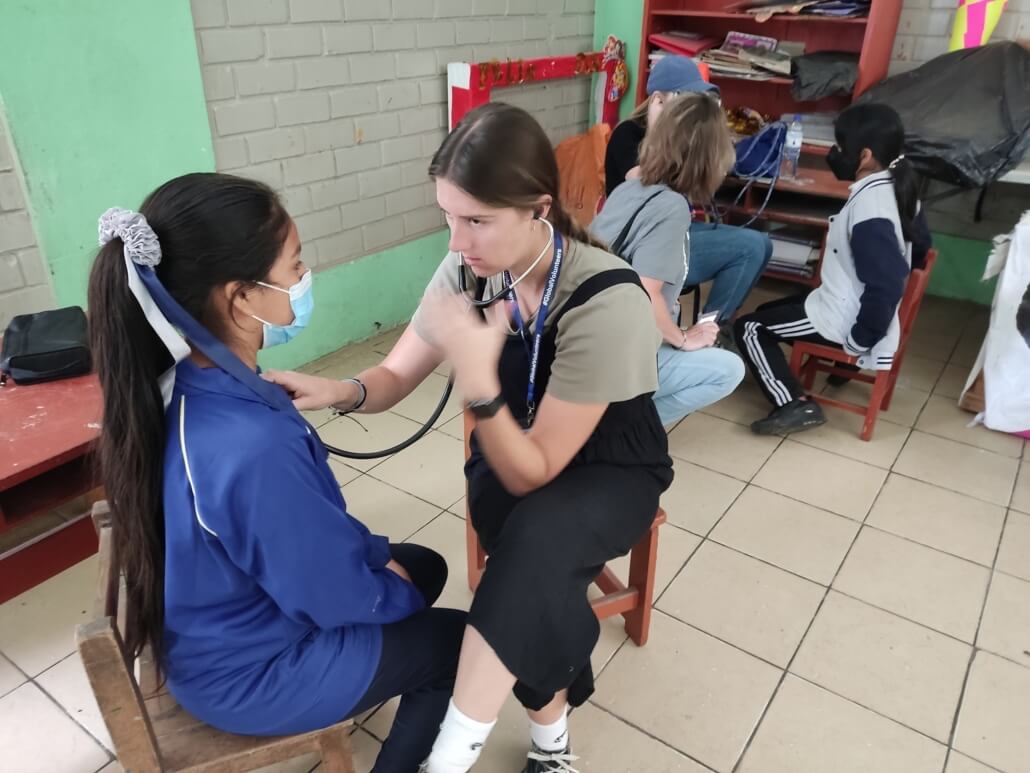
Professor Larsen was enthusiastic about the service-learning program. “We provided a significant amount of primary prevention programming as well as participating in RCP home visits. I am always amazed that even though I don’t speak the language, we are still able to communicate at a meaningful level.” Volunteer Caitlin Salfer likewise shared her appreciation for the opportunity to serve, “I learned resilience from the RCP moms who were determined to make the best life for their child, despite their circumstances or lack of resources. They welcomed us into their homes with welcome arms, took in advice and knowledge, and I thank them for that. I experienced appreciation through those moms.” Clare Michalowicz also expressed her awe for the Ventanilla moms. “The mothers of Ventanilla have shown me what true resilience and love looks like. Every day has new lessons to offer us.”
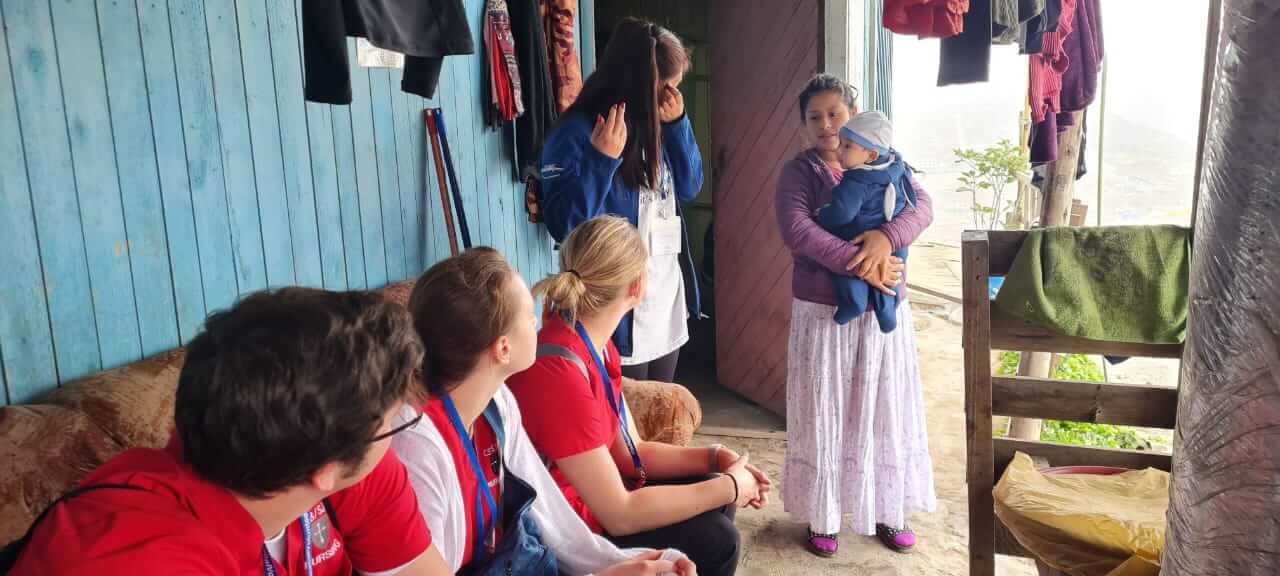
Through Interactive Workshops, Nursing Students Share Their Knowledge with Moms and Teens
The three primary components of Global Volunteers’ RCP Program are interactive workshops, regular home visits, and psychosocial support. Parents worldwide want what is best for their children, but first, they need to know what is best. Parent workshops transfer essential knowledge on health, hygiene, nutrition, child development, and related topics. Volunteer health students, faculty, and other professionals prepare and conduct these workshops. Using prepared PowerPoint presentation outlines, volunteers offer their insights by applying their education, knowledge, experience, and stories to the topics.
This team of volunteer students taught several workshops to Peruvian mothers. The first was CPR for infants. The nursing students focused on what mothers can do in emergencies to help their babies, and fielded questions about common health risks mothers face. The moms who attended this workshop expressed gratitude for the opportunity to learn how to respond in emergencies.
The RCP Program begins with pregnancy, continues through the 18th birthday, and focuses on the first 1000 days of life. Mother’s nutrition during pregnancy and breastfeeding is essential for every child’s future, so this team of nursing students also conducted a workshop on this topic. Describing the experience of presenting to such an engaged audience, volunteer Isaac Dubois recounted, “I surprised myself with the joy I felt in seeing several of the mothers from my home visits attending the presentations. Even more so, I was thrilled at the entire audience’s rapt attention, participation, and thoughtful questioning. I truly felt like the majority gained something meaningful from our information. I’m glad that we were able to lend our voices to the project.”
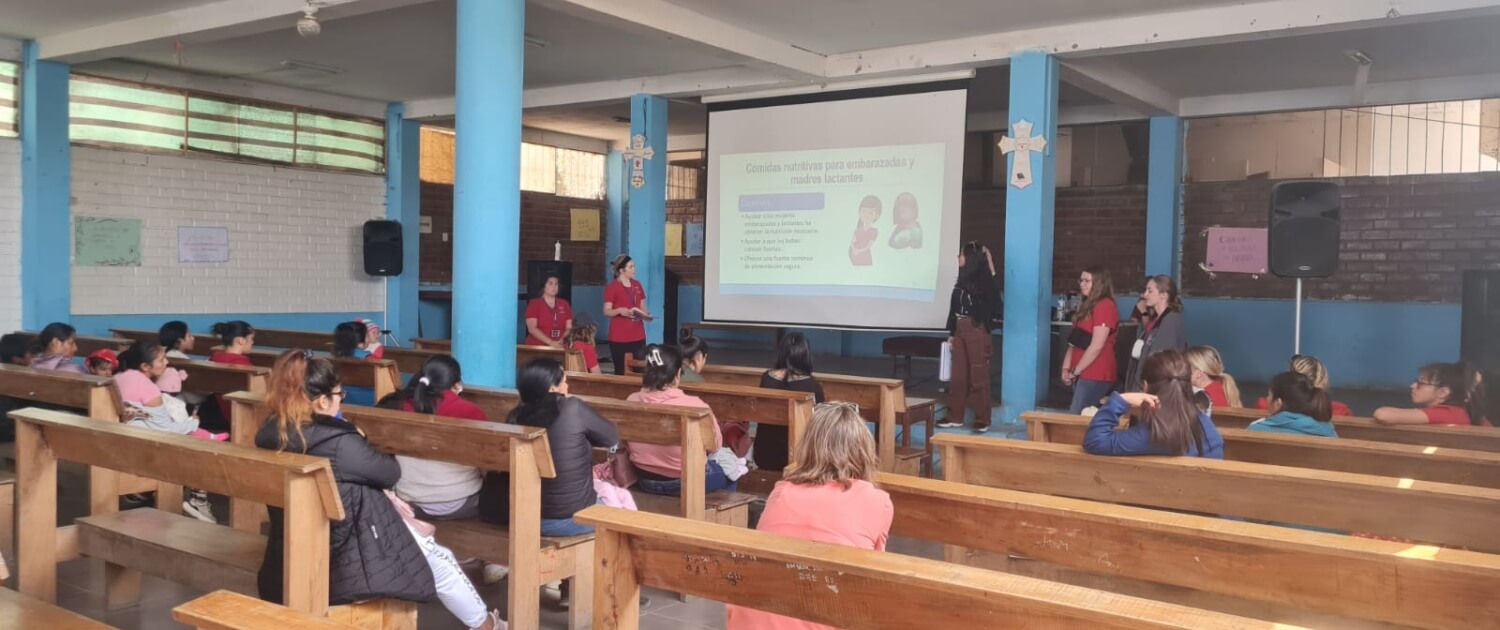
In addition, 80 teens in grades ten, eleven, and twelve at Sagrada Familia participated in an interactive workshop on CPR and First Aid led by the volunteers. Diego Acosta reported that the Peruvian youth were incredibly engaged and excited to learn new things from their volunteer friends. Volunteer Krista Korkowski shared in her team journal how rewarding the experience was. “My day was so full and exciting that by the time I got to teach CPR with my group, I was beyond happy. CPR went very well and I feel like everyone appreciated the information. It makes me feel good that there are now at least 80+ people just one step closer to being able to save someone’s life.”
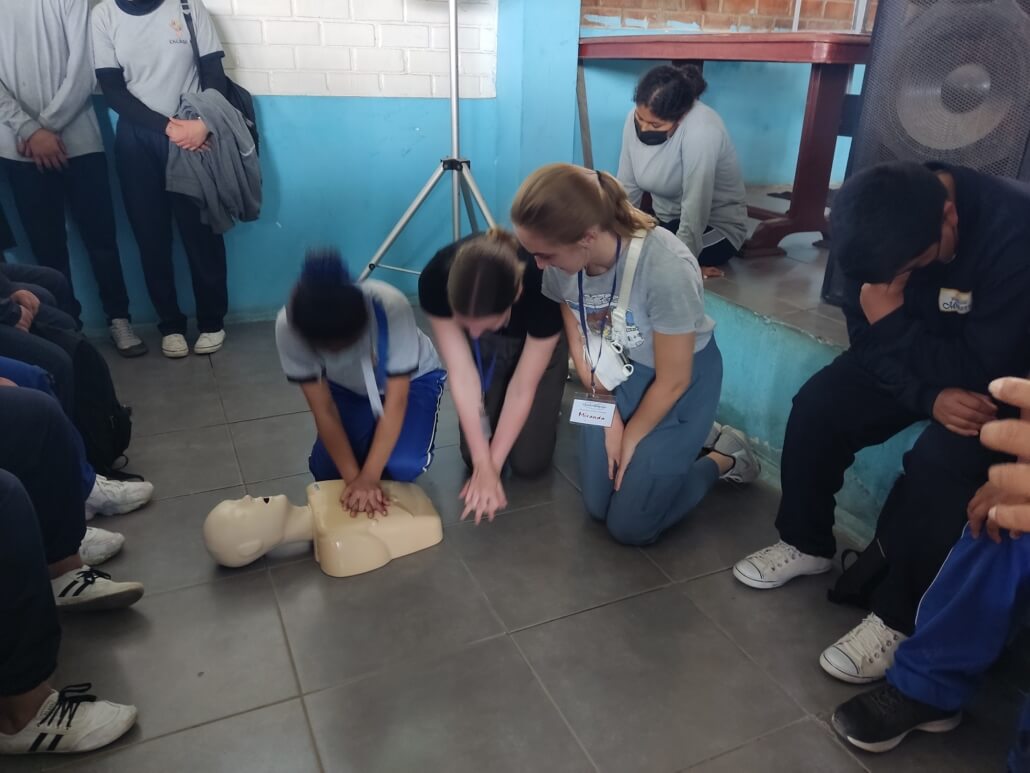
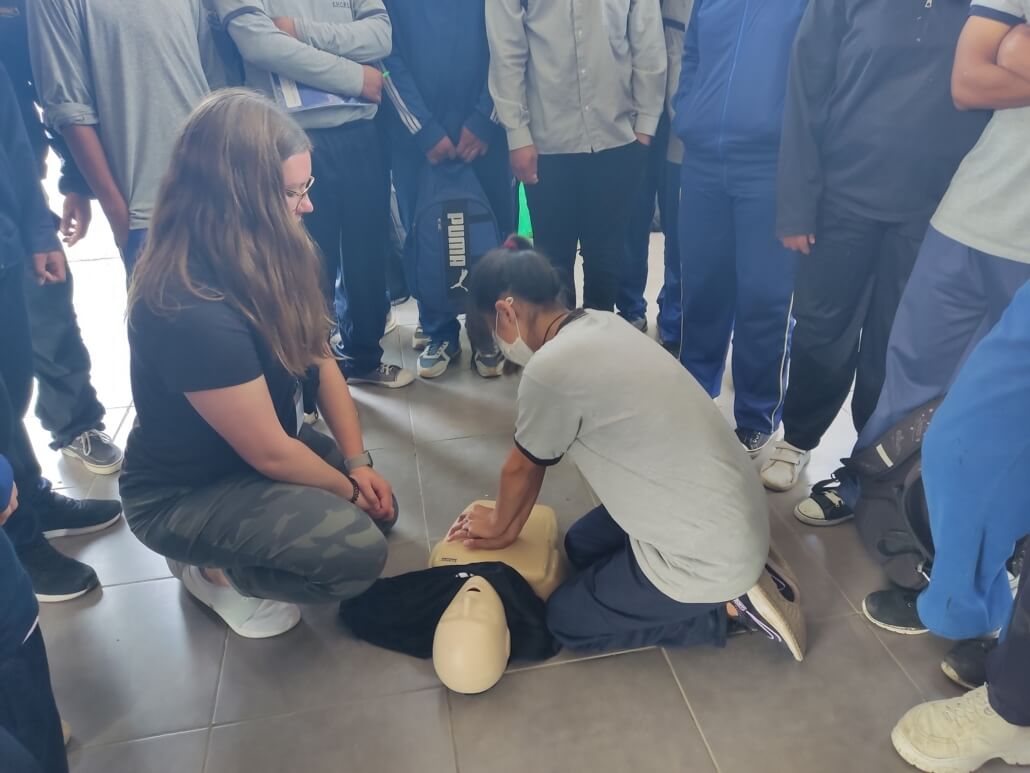
Jenna Bukowski emphasized the importance of basic First Aid and CPR. “Teaching CPR can help save a life of so many people in the community. Health services are very limited in this area, so teaching children basic steps can save a life.” Makayla Miller said that encouraging Sagrada Familia youth to improve their health and well-being was the most rewarding part of her service experience. “Primarily, I was able to contribute my nursing skills to the community as I promoted health and well-being within the school and beyond. I’ve helped children reach their full potential by encouraging their studies as well as promoting health and well-being among all in the community.”
Nursing Students Conduct Home Visits, Focusing on Health and Wellness
A second vital component of the RCP Program is home visits conducted by Global Volunteers staff caregivers and volunteer healthcare students and professionals. During the weekly visits, the lessons learned at the parent workshops are reinforced using flipcharts, mothers are encouraged to raise questions about their families’ healthcare, hygiene, and nutrition issues, and the caregivers offer advice about how best to use the various household technologies that are a part of the program. RCP Caregiver Bea Rodríguez and RCP Technology Coordinator Jorge Sánchez Prieto organized and led the home visits, and the community leaders were eager to engage the nursing students to capitalize on their knowledge. Over their two weeks of service, the students participated in many home visits with local families, spoke with moms about common health issues, and helped address their concerns. Bea and Jorge functioned as interpreters among volunteers and mothers.
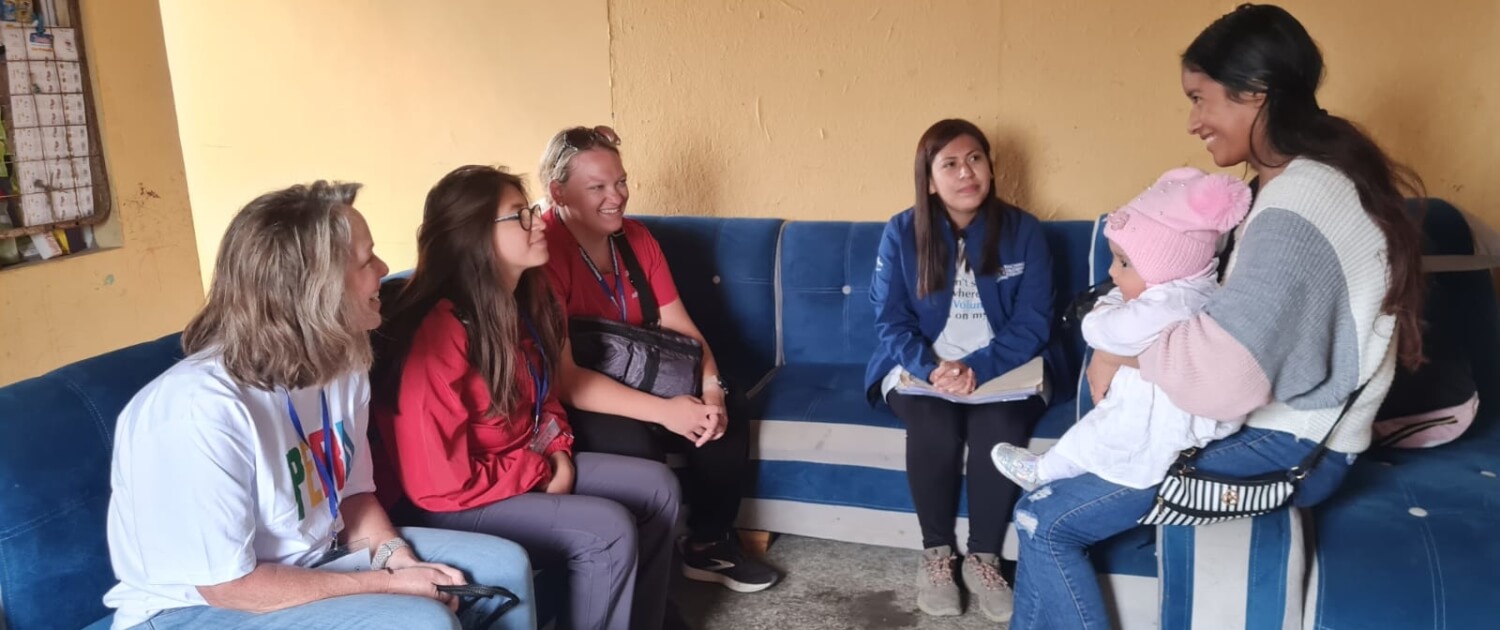
“I surprised myself with the joy I felt in seeing several of the mothers from my home visits attending the presentations. Even more so, I was thrilled at the entire audience’s rapt attention, participation, and thoughtful questioning. I truly felt like the majority gained something meaningful from our information. I’m glad that we were able to lend our voices to the projects.”
– Isaac Dubois, Saint John’s University nursing study and volunteer in Peru
Students Offer Psychosocial Support by Merely Showing Up
The effectiveness of the RCP Program depends on parents, especially mothers, to change behavior to prevent childhood disease, have healthy pregnancies, improve nutrition, wash hands with soap and water, and so much more. It is nearly universal that women will do anything to help improve their children’s lives. However, behavioral change is difficult for all of us. But when a mother knows that a volunteer traveled a great distance to be present with her, and the volunteer vocally affirms what the mom is doing to improve her child’s wellbeing, the challenge becomes a little bit easier. When volunteers show up on a regular basis, her determination to change is reinforced, and amazing things can happen. These nursing students showed up and started the process of helping mothers make the necessary changes so their children will experience heathier and happier lives.
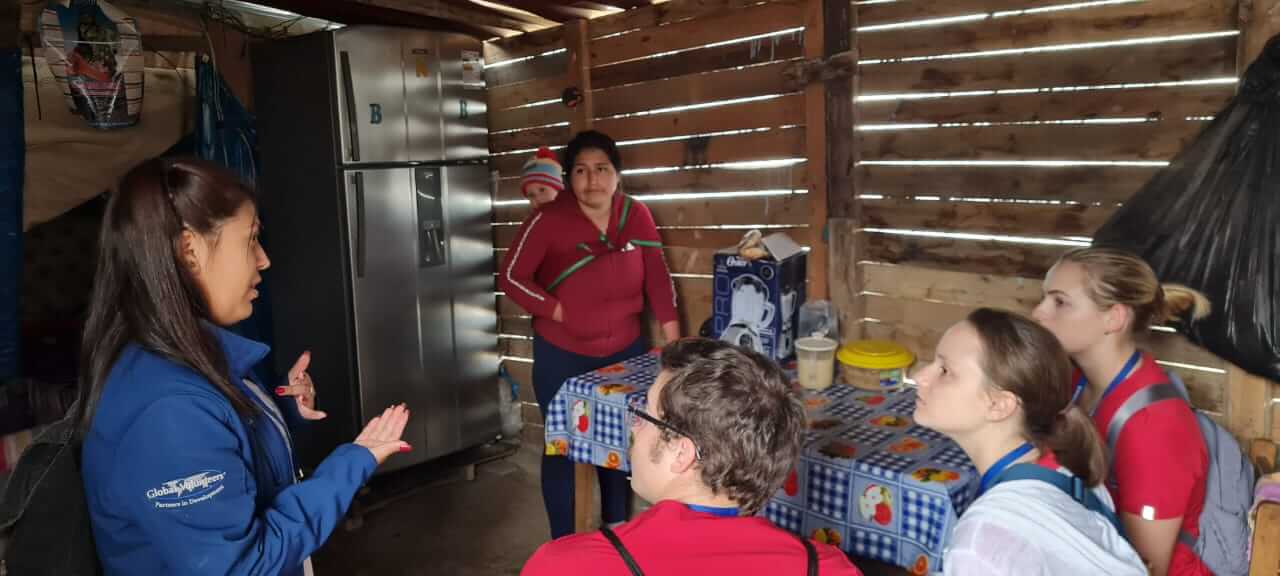
Earned Experiences for Future Nursing Careers
At the end of her service program, nursing student volunteer Addey Vochoska related that her service experience working with Peruvian youth and families affirmed why she wanted to become a nurse. “Being here in Peru reminds me why I want to be a nurse: to help others and to make a difference in the world. I think we can all agree that this community is the perfect example of how love, joy, and kindness can be found among those who have so little. We can all take some of these qualities, bring them back home with us, and use them during our nursing careers. To say that Sagrada Familia is a wonderful place is an understatement. It truly is one-of-a-kind. Years from now, I hope we all reflect on this trip. Whether we remember how welcoming the kids and community members were or the challenges we faced. We should all know that we grew together, laughed together, loved together, and changed lives together. Most importantly, we learned that it’s the simple things in life that matter; these are the things that make the biggest and longest-lasting impacts. Forever grateful for you all and for Sagrada Familia.”
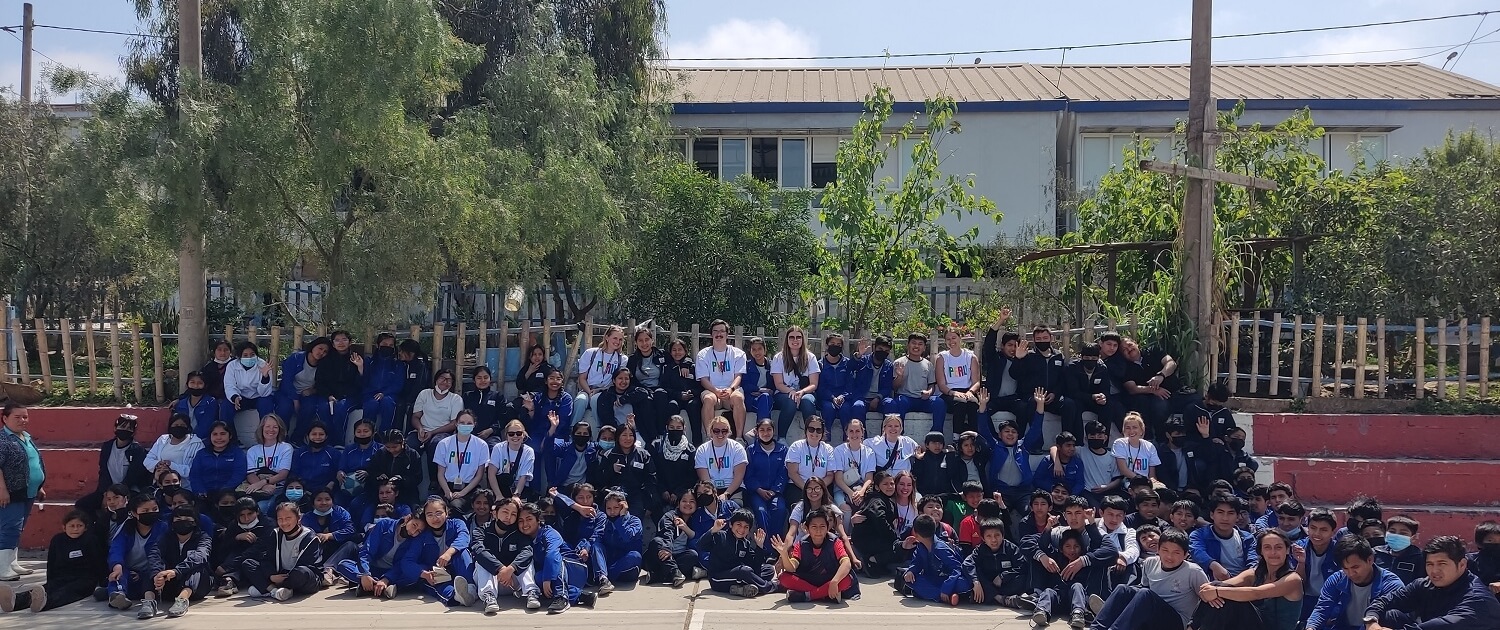
While laying the groundwork for the success of the RCP Program in Ventanilla to support parents in providing the best life possible for their children, the student volunteers learned as much from the Peruvians with whom they worked as they shared through their service. As aspiring health professionals, the students affirmed that this service program broadened their worldview, showed them a more expansive reality of public health and nursing than they have seen in classrooms, and taught them more cultural competence for patient care.
“Being here in Peru reminds me why I want to be a nurse: to help others and to make a difference in the world.”
– Addey Vochoska, College of Saint benedict nursing student and volunteer in Peru
Diego Acosta stated that this team of nursing students significantly impacted the community of Ventanilla. “The families enrolled in the RCP Program expressed that they greatly benefitted from the College of St. Ben’s nursing students. They received advice and learned from the workshops presented by the students and their professor, Rachelle Larsen. In addition, they were well organized, hardworking, and flexible with their service in this first RCP service program in Peru.” Diego expressed his enthusiasm and gratitude for working with a team of dedicated volunteers to lay the groundwork for the RCP Program in Peru for many more years of service. All the volunteers were great. He noted, “Annie Foley has been a great example of hard work and joyful service. She has done everything with a smile and great sensibility.” Diego looks forward to their colleagues returning to continue the work this team started.
Global Volunteers conducts Reaching Children’s Potential (RCP) programs in rural Tanzania, Peru, and soon in the colonias of the Rio Grande Valley in Texas. Each RCP program provides healthcare professionals and students opportunities to work alongside Global Volunteers RCP staff to enhance mothers’ and children’s care, health, hygiene, and nutrition through workshops, home visits, and psychosocial support.
Call our Strategic Partnerships Department at (651) 407-6138 to visit about how your students can positively impact children’s lives by volunteering for one, two, or three weeks.

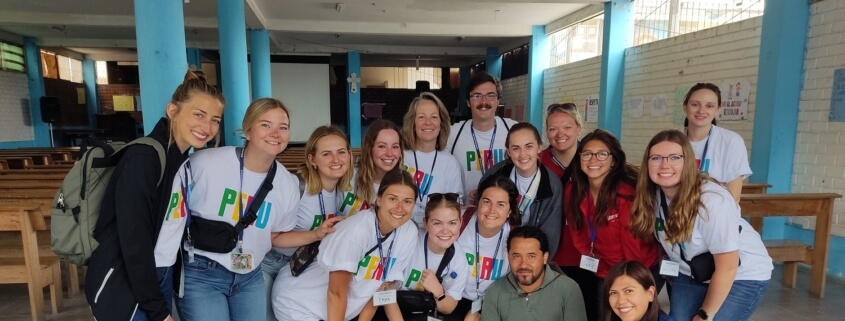


Leave a Reply
Want to join the discussion?Feel free to contribute!